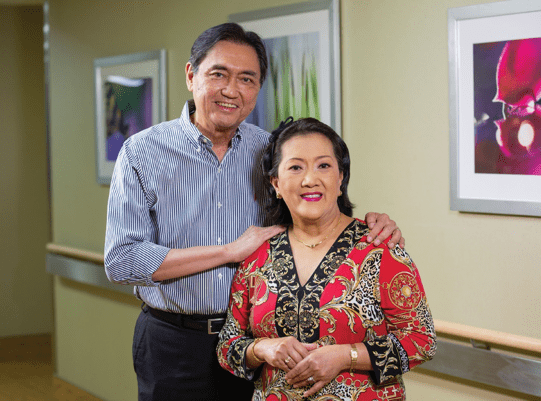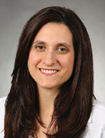“I saw how they treated my wife at Newark Beth Israel — she was like a VIP.”

A Husband and Wife Both Developed Lung Cancer, but Their Treatments Were Very Different
Veronica and Edmundo Navarro never expected to live out their wedding vow quite as they have. “We promised ‘in sickness and in health,’ but I didn’t think about it so literally,” says Veronica, 68. She and Edmundo, 70, both were diagnosed with lung cancer in 2019 and have had overlapping treatments. Together, the couple has experienced firsthand how treatment for lung cancer has advanced, with very promising results.
A Turnaround
The family’s ordeal began with Veronica. She first realized something was terribly wrong in March 2019, when she started coughing up blood, in addition to her chronic shortness of breath. “She had been having respiratory symptoms for several months,” says Sari Jacoby, MD, medical oncologist at the Newark Beth Israel Medical Center (NBI) Frederick B. Cohen, MD, Comprehensive Cancer and Blood Disorders Center. “It had been brewing for a while.”
The blood led to a chest X-ray that revealed a worrisome smudge, and Veronica was referred to the cancer center at NBI. There, a diagnostic procedure called endobronchial ultrasound (EBUS) bronchoscopy discovered a cancerous stage 3 tumor at the spot where her trachea (windpipe) branched into her left lung. The tumor was blocking airflow to the entire lung. “By the time she got here, that whole side of her lung had collapsed,” Dr. Jacoby says. “She was critically ill and oxygen-dependent.”
“I didn’t cry, believe it or not,” Veronica says of her diagnosis. “I asked the doctors, ‘Help me to fight this.’ I wanted to do everything I could do to recover and survive.” Dr. Jacoby felt hopeful. “We have many more options for treating lung cancer than in the past, and I was completely optimistic that there would be therapies to get the disease under control,” Dr. Jacoby says.
The tumor’s location made surgery risky because removing it would compromise Veronica’s entire left lung. Instead, Veronica underwent a regimen of concurrent radiation treatments and weekly chemotherapy, punctuated by two stronger sessions of chemotherapy to shrink the tumor.
By June, Veronica noticed she could breathe better. “When Dr. Jacoby listened to my left lung, she said, ‘Oh my gosh, you’re amazing! I can hear air!’” Veronica recalls.
Up to that point, Dr. Jacoby had heard nothing from the left lung. “Suddenly it sounded completely normal,” she says. “Air was moving all the way through.”

“I want to call Dr. Jacoby my miracle doctor,” says Veronica. She has since been on a maintenance treatment consisting of an infused immunotherapy every two weeks and continues to do well. As Veronica’s radiation and chemo began wrapping up in late summer, Edmundo began to experience shortness of breath. “But I was ignoring it,” he confesses.
“Edmundo accompanied his wife to pretty much every visit, and he began to look frailer,” says Dr. Jacoby. “He was working and active but fatigued and losing weight. But he’s extremely quiet and doesn’t complain.” Then Edmundo, too, began seeing blood when he coughed.
There was no question in Edmundo’s mind about where to get checked. “I saw how they treated my wife at Newark Beth Israel,” he says. “She was like a VIP.” He went through a round of tests, including an EBUS. “When I saw Dr. Jacoby appear afterward, I thought, ‘Uh-oh, I think I have the same ailment as my wife,’” Edmundo says. He was diagnosed with stage 4 metastatic lung cancer, and it had established several lesions in his brain.
Personalized Approach
Having a husband and wife develop lung cancer at the same time was an unusual situation. Although both Edmundo and Veronica had lung cancer, their cases were not the same.
“They had two distinct diseases. The drivers of each were completely different mechanisms,” Dr. Jacoby says. “There’s been tremendous evolution and growth in the last 10 years as we better understand what causes marked lung cancer and how to treat it.” Today, advanced lung cancer treatment allows doctors to take a personalized approach.
While Veronica’s cancer was vulnerable to the final part of her treatment, Edmundo was susceptible to an oral drug. “I take one pill daily,” he says.
In addition, he underwent a procedure called stereotactic radiosurgery, a minimally invasive surgery that uses 3D imaging to target high doses of radiation, for his brain lesions. “It focuses just on the site of the tumor to kill cancer cells but preserve healthy brain tissue,” Dr. Jacoby explains.
Five of Edmundo’s six brain lesions have disappeared, and the one that remained has shrunk. His lung tumor has also shrunk almost to vanishing, though his condition is complicated by the lung conditions emphysema and chronic obstructive pulmonary disorder (COPD). “Our daily pill is working,” Edmundo says. “What seemed a very dark sky now has some great daylight.”
Sharing lung cancer has brought the couple closer, Veronica says. “Having the same ailment makes me understand how he feels, how he thinks, and probably what to expect because we’re on the same ride,” she says. She credits their strong Catholic faith and their positive attitude for helping them get through their health challenges.
The couple’s sense of closeness extends to their caregiving teams as well. “I’m so glad I stuck with Newark Beth Israel,” Edmundo says, even though the facility is outside their home community. “Everyone treats you like family.”
RWJBarnabas Health and the Frederick B. Cohen, MD, Comprehensive Cancer and Blood Disorders Center at Newark Beth Israel Medical Center, together with Rutgers Cancer Institute of New Jersey—the state’s only NCI-Designated Comprehensive Cancer Center—provide close-to-home access to the latest treatment options.
For more information, call 844.CANCERNJ or visit Newark Beth Israel Medical Center.